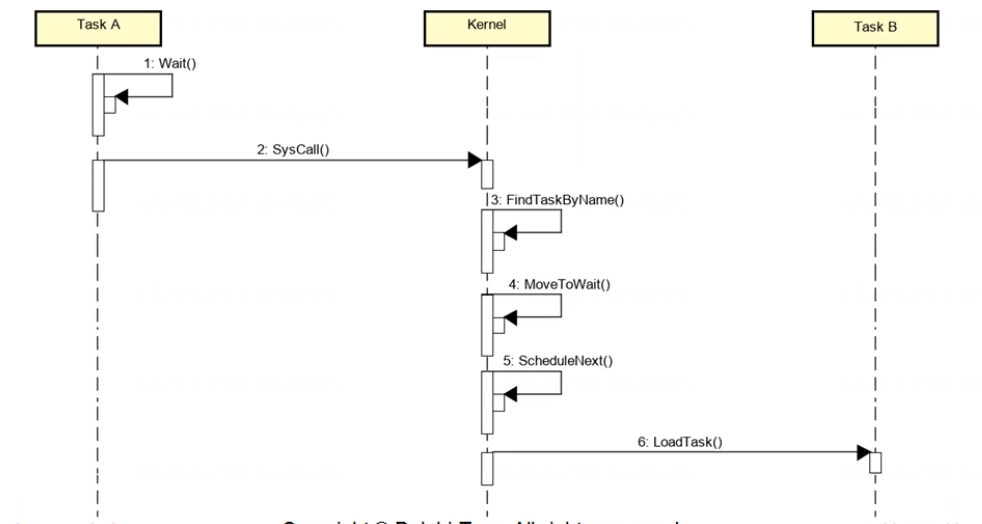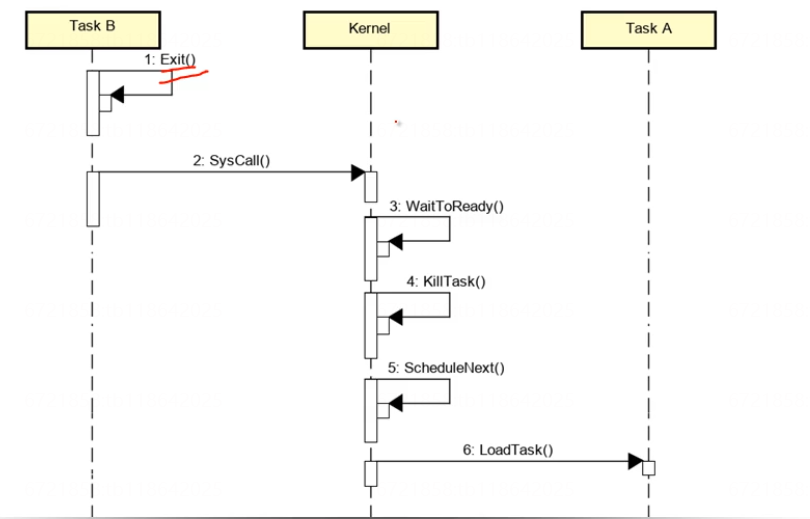shell的本质
taskA wait (“TaskB”)
1
2
3
4
5
6
7
8
9
10
11
12
13
14
15
16
| typedef struct
{
RegValue rv;
Descriptor ldt[3];
ushort ldtSelector;
ushort tssSelector;
void (*tmain)();
uint id;
ushort current;
ushort total;
char name[16];
Queue wait;
byte* stack;
Event* event;
} Task;
|
taskA移入taskB的等待队列

taskB结束后要将taskB的等待队列的任务取出来

功能函数
查找任务FindTaskByName
1
2
3
4
5
6
7
8
9
10
11
12
13
14
15
16
17
18
19
20
21
22
| static Task* FindTaskByName(const char* name)
{
Task* ret = NULL;
if( !StrCmp(name, "IdleTask", -1) )
{
int i = 0;
for(i=0; i<MAX_TASK_BUFF_NUM; i++)
{
TaskNode* tn = AddrOff(gTaskBuff, i);
if( tn->task.id && StrCmp(tn->task.name, name, -1) )
{
ret = &tn->task;
break;
}
}
}
return ret;
}
|
waitTask
根据名字找到目标任务后,将当前任务放入目标任务的等待队列中
1
2
3
4
5
6
7
8
9
10
11
12
13
14
| void WaitTask(const char* name)
{
Task* task = FindTaskByName(name);
if( task )
{
Event* evt = CreateEvent(TaskEvent, (uint)task, 0, 0);
if( evt )
{
EventSchedule(WAIT, evt);
}
}
}
|
事件
事件产生:任务进入等待状态
事件销毁:任务进入可执行状态
当任务请求输入时(调用readkey()时)产生事件,任务进入等待
task模块根据事件描述执行具体的调度动作(调度进哪一个等待队列)
事件定义:触发事件在就绪状态和等待状态之间的切换的因素
1
2
3
4
5
6
7
8
9
10
11
12
13
14
15
16
17
18
19
20
21
22
23
24
25
26
27
28
29
30
31
32
33
34
35
| enum
{
NoneEvent,
MutexEvent,
KeyEvent,
TaskEvent
};
typedef struct
{
uint type;
uint id;
uint param1;
uint param2;
} Event;
Event* CreateEvent(uint type, uint id, uint param1, uint param2)
{
Event* ret = Malloc(sizeof(Event));
if( ret )
{
ret->type = type;
ret->id = id;
ret->param1 = param1;
ret->param2 = param2;
}
return ret;
}
void DestroyEvent(Event* event)
{
Free(event);
}
|
事件机制的设计
由于当前任务出现了事件,因此需要记录当前事件的信息并且将当前任务进入某个等待队列
1
2
3
4
5
6
7
8
9
10
11
12
13
14
15
16
17
18
19
20
21
22
23
24
25
26
27
28
29
30
31
32
33
34
35
36
37
38
39
40
41
42
43
44
45
46
47
48
49
50
51
52
53
54
55
56
57
58
59
60
61
62
63
64
65
|
void EventSchedule(uint action, Event* event)
{
switch(event->type)
{
case KeyEvent:
KeySchedule(action, event);
break;
case TaskEvent:
TaskSchedule(action, event);
break;
case MutexEvent:
MutexSchedule(action, event);
break;
default:
break;
}
}
static void TaskSchedule(uint action, Event* event)
{
Task* task = (Task*)event->id;
if( action == NOTIFY )
{
WaittingToReady(&task->wait);
}
else if( action == WAIT )
{
WaitEvent(&task->wait, event);
}
}
static void MutexSchedule(uint action, Event* event)
{
Mutex* mutex = (Mutex*)event->id;
if( action == NOTIFY )
{
WaittingToReady(&mutex->wait);
}
else if( action == WAIT )
{
WaitEvent(&mutex->wait, event);
}
}
static void WaitEvent(Queue* wait, Event* event)
{
gCTaskAddr->event = event;
RunningToWaitting(wait);
ScheduleNext();
}
|
task模块
根据事件执行调度,根据不同的事件进入不同等待队列
1
2
3
4
5
6
7
8
9
10
11
12
13
14
15
16
| void WaitTask(const char* name)
{
Task* task = FindTaskByName(name);
if( task )
{
Event* evt = CreateEvent(TaskEvent, (uint)task, 0, 0);
if( evt )
{
EventSchedule(WAIT, evt);
}
}
}
|
mutex模块
1
2
3
4
5
6
7
8
9
10
11
12
13
14
15
16
17
18
19
20
21
22
23
24
25
26
| static void DoWait(Mutex* mutex, uint* wait)
{
Event* evt = CreateEvent(MutexEvent, (uint)mutex, 0, 0);
if( evt )
{
*wait = 1;
EventSchedule(WAIT, evt);
}
}
static void SysNormalEnter(Mutex* mutex, uint* wait)
{
if( mutex->lock )
{
DoWait(mutex, wait);
}
else
{
mutex->lock = 1;
*wait = 0;
}
}
|




